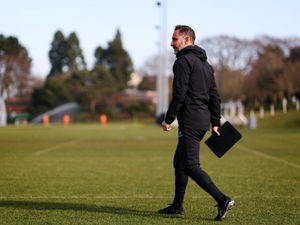Magical Wolves memories of going up
April 18. Not perhaps usually a stand-out date in the calendar.

Although, Joan of Arc was beautified on this day back in 1909, the International Court of Justice held its inaugural meeting in 1946, and the Republic of Zimbabwe came into being in 1980. Notable events in history for sure.
High-profile birthdays? Cricketer Malcolm Marshall in 1958, actor David Tennant in 1971. And then goalkeeper Lukasz Fabianski in 1985. Not sure if anyone was in his line of vision at the time.
But for Wolves, certainly in recent history, today’s date throws up a couple of notable anniversaries of dramatic and indeed happy days at Molineux.
On this day 15 years ago, a close-range finish from Sylvan Ebanks-Blake secured a 1-0 win over Queens Park Rangers, sparking scenes of pure, unadulterated delight with a pitch invasion marking promotion to the Premier League.
And then, a decade ago, in League One, six days after securing promotion away at Crewe which sparked a similar pitch invasion and unbridled delirium, Wolves welcomed Rotherham to Molineux.
An incredible spectacle ensued, culminating in a 6-4 win – game, set and match.
April 18. Different matches. Different divisions. Same emotions. Same memories. The sort of football matches fans just don’t forget.
Wolves have only had 11 promotions throughout their history. The most recent, under Nuno Espirito Santo, is quite possibly the most spectacular given how it was achieved and what it led to with the return of European football and the sort of progress which sees Wolves welcoming Premier League-chasing Arsenal on Saturday night as a now established part of the top division.

And few can argue against the play-off final of 2003 as perhaps the most magnificent day of all, Wolves rising to the winner-takes-all challenge in such deadly and devastating fashion to reach the Premier League for the very first time. Goosebumps, even now.
But the Championship and League One titles of 15 and 10 years ago respectively? With their significant April 18 fixtures? Momentous and memorable.
They were achieved by two managers with different personalities and different approaches. Managers, however, who shared a single-minded vision and complete belief and confidence in what they needed to do to bring success.
For Mick McCarthy, checking in with barely 11 senior players, it was about quickly building a squad based around ‘young and hungry’ potential. Of recruits, mainly in their early-20s, who were good and solid characters, had already enjoyed plenty of first-team football, but were ready to be part of a new challenge to meet their burning ambition.
There were similarities with Kenny Jackett’s arrival. He, too, had to swiftly reshape a squad and was faced with overturning, outright vitriol following back-to-back relegations while McCarthy’s big challenge was ridding Wolves of a sense of apathy which had crept in during Glenn Hoddle’s final season.
While several high-profile figures were deemed surplus to requirements – the birth of the ‘bomb squad’ – Jackett was able to bring in experience such as Sam Ricketts, Kevin McDonald and Scott Golbourne, alongside offering the club’s academy graduates their opportunity. “Part of the interview process was to go through what I would do during the first 30 days if I was successful in getting the job,” Jackett recalls of his meetings with firstly Kevin Thelwell, then Jez Moxey and Steve Morgan.

“Wolves were going through some specific issues and it showed me that they were looking for some action in the first 30 days to set the tone and take things in a slightly different direction.





